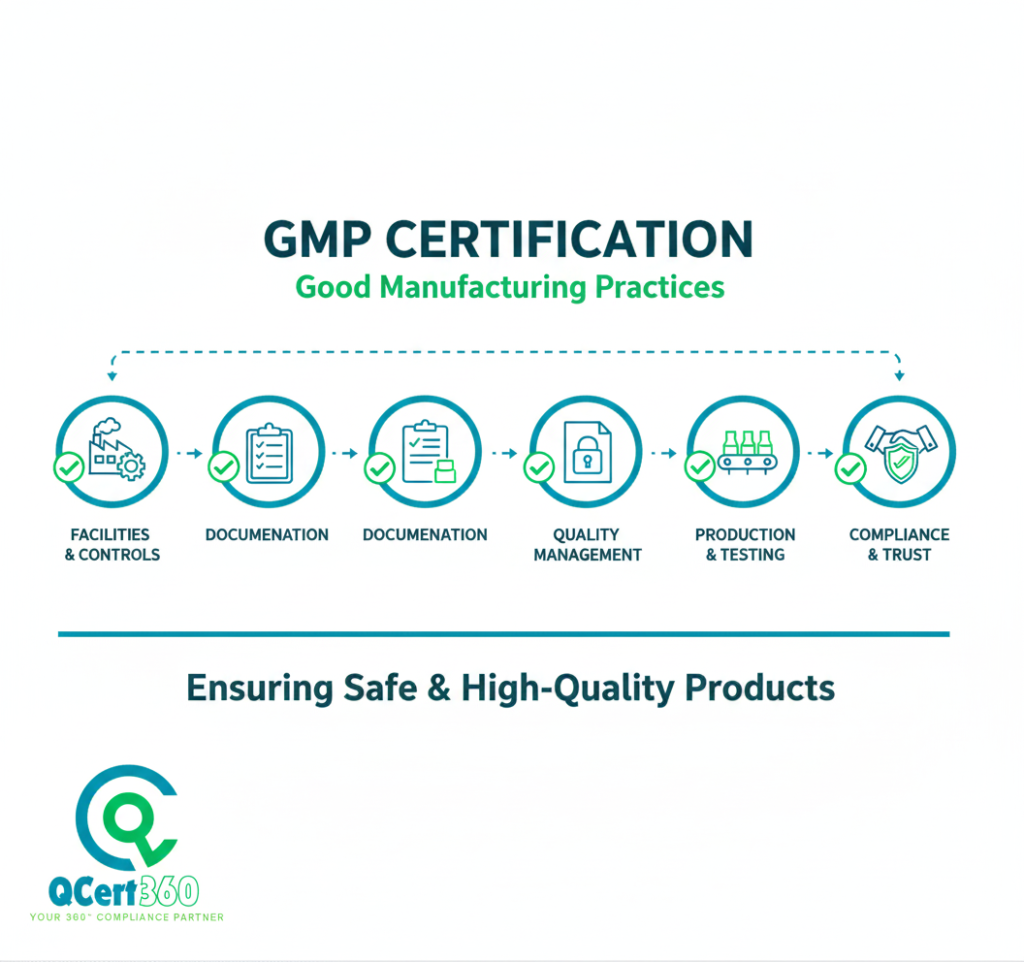GMP Certification
GMP (Good Manufacturing Practice) Certification is a standard ensuring that products—particularly pharmaceuticals, food, and cosmetics—are consistently produced and controlled to quality standards. It covers all aspects of production, including raw materials, equipment, staff training, hygiene, documentation, and quality control processes. GMP aims to minimize risks of contamination, errors, and deviations, ensuring product safety, efficacy, and compliance with regulatory requirements. Certification demonstrates a company’s commitment to maintaining high-quality manufacturing practices, protecting consumers, and meeting legal obligations. It enhances credibility, market access, and stakeholder confidence, making it essential for manufacturers in highly regulated industries worldwide.
Request a Call Back
Get Free Consultation
Have any Questions?
Mail us Today!
contact@qcert360.com
GMP Certification – Ensuring Quality, Safety, and Compliance in Production
For manufacturers in pharmaceuticals, cosmetics, food, and dietary supplements, Good Manufacturing Practices (GMP) certification is a mark of quality and reliability. It demonstrates that production processes meet stringent safety, hygiene, and regulatory standards, ensuring products are consistently safe, effective, and high-quality. Achieving GMP certification is more than regulatory compliance—it reflects a commitment to operational excellence, consumer protection, and global market readiness.
What is GMP Certification?
GMP (Good Manufacturing Practices) certification verifies that manufacturing facilities follow standardized procedures for production, quality control, storage, and distribution. It covers aspects like process validation, equipment calibration, personnel training, and record-keeping. The certification applies across industries producing consumables, pharmaceuticals, cosmetics, and supplements, helping organizations ensure product integrity, reduce contamination risks, and meet international compliance requirements.
Why GMP Certification Matters
GMP certification is more than a regulatory formality—it directly impacts a company’s market presence and reputation.
Market Access – GMP compliance is often a prerequisite for selling pharmaceuticals, food, cosmetics, and dietary supplements both domestically and internationally. It opens doors to highly regulated markets and major retailers.
Product Safety – By following standardized manufacturing procedures, organizations significantly reduce the risk of contamination, adulteration, or defective products reaching consumers.
Regulatory Compliance – Adhering to GMP ensures alignment with national and international quality and safety regulations, helping avoid fines, product recalls, and legal complications.
Consumer Confidence – Certification reassures customers that every product batch meets stringent safety and quality standards, fostering trust and loyalty.
Business Credibility – GMP certification strengthens your brand’s reputation with regulators, distributors, and end-users, signaling commitment to excellence and professional integrity.
Ultimately, GMP certification not only safeguards consumers but also positions your business as a trusted, compliant, and reliable market player.

Benefits:
Enhanced Marketability:
Obtaining certification boosts brand visibility and credibility, making products and services more attractive to consumers and increasing market share in global markets.
Consumer Trust & Satisfaction:
Certification assure customers of consistent quality, safety, and reliability, fostering trust, increasing brand loyalty, and ensuring higher levels of customer satisfaction.
Regulatory Compliance
Certification ensure compliance with global standards and regulations, helping businesses avoid legal issues, penalties, and enabling smoother entry into diverse international markets.
Competitive Advantage
Holding certification distinguishes a business from competitors, signaling superior quality and reliability, and positioning the company as an industry leader in the market.
Global Expansion
Certification provide access to new international markets, demonstrating that a business meets global standards, which facilitates expansion and opens doors to new business opportunities worldwide.
Risk Mitigation & Efficiency
Certifications help identify and mitigate risks, streamline operations, and reduce errors or defects, ensuring efficiency and consistency while safeguarding against operational disruptions.
Core Components of GMP Certification
GMP certification relies on a structured framework to guarantee product quality, safety, and consistency across all manufacturing stages.
Standardized Production Processes – Clear procedures and protocols ensure that every batch is produced consistently, minimizing variability and maintaining high-quality standards.
Equipment and Facility Management – Regular maintenance, cleaning, and calibration of machinery and facilities prevent contamination, ensure operational efficiency, and extend equipment lifespan.
Personnel Training and Hygiene – Employees are trained in hygiene, safety, and operational procedures, ensuring they follow best practices at every stage of production.
Quality Control and Testing – Routine inspections and laboratory testing verify product safety, potency, and compliance with regulatory standards, reducing risks of defects or recalls.
Documentation and Record-Keeping – Comprehensive records of production, quality checks, and corrective actions provide transparency, facilitate audits, and demonstrate compliance to regulators.
These components work together to create a controlled, reliable, and safe manufacturing environment, reinforcing both consumer safety and regulatory adherence.
Benefits of GMP Certification for your organisation
Achieving GMP certification delivers significant advantages for manufacturers and businesses in regulated industries:
Market Access – Certification opens doors to national and international markets where GMP compliance is mandatory, facilitating partnerships with distributors and global supply chains.
Risk Reduction – By adhering to strict production and quality standards, companies minimize the likelihood of product recalls, contamination incidents, and regulatory penalties.
Consumer Trust and Brand Loyalty – Verified compliance with GMP standards reassures customers of product safety and consistent quality, strengthening brand reputation and loyalty.
Operational Efficiency – Standardized processes and documentation streamline production, reduce errors, limit waste, and improve overall operational consistency.
Competitive Advantage – GMP certification distinguishes a company from non-certified competitors, showcasing commitment to quality, safety, and regulatory compliance.
Overall, GMP certification is more than a regulatory requirement—it serves as a strategic tool to enhance business credibility, ensure product safety, and maintain a strong foothold in competitive, quality-conscious markets.
Who Needs GMP Certification?
GMP certification is essential for any organization involved in the production, handling, or distribution of regulated products where safety, quality, and consistency are critical:
Pharmaceutical Manufacturers – Companies producing tablets, injectables, creams, and supplements must follow strict GMP standards to ensure product safety and efficacy.
Cosmetic Companies – Skincare, personal care, and hygiene product manufacturers rely on GMP to guarantee hygiene, quality, and compliance with regulatory expectations.
Food and Beverage Producers – Processed foods, dietary supplements, and nutraceutical manufacturers require GMP certification to minimize contamination risks and maintain consistent product quality.
Contract Manufacturers – Businesses producing goods on behalf of brands must adhere to GMP to meet client specifications and regulatory requirements.
Exporters and Distributors – Organizations exporting products internationally or distributing them in regulated markets need GMP certification to ensure compliance and facilitate market access.
Essentially, any company producing or handling products that impact consumer health and safety benefits from GMP certification, as it demonstrates commitment to quality, compliance, and responsible manufacturing practices.
Ongoing Compliance Under GMP
Maintaining GMP certification is not a one-time achievement—it demands continuous vigilance and proactive management. Organizations must:
Conduct Regular Audits and Inspections – Perform internal reviews and accommodate third-party audits to ensure all production processes remain compliant.
Update Processes with Regulatory Changes – Adapt procedures promptly when new regulations or industry standards emerge to avoid compliance gaps.
Staff Training and Development – Continuously educate employees on hygiene practices, safety protocols, and process improvements to maintain high-quality standards.
Supply Chain Monitoring – Ensure all suppliers and partners adhere to GMP requirements, preserving product integrity from raw materials to finished goods.
Corrective and Preventive Actions – Quickly identify, address, and prevent non-conformities to minimize risks and maintain operational excellence.
This ongoing commitment guarantees that products consistently meet quality, safety, and regulatory expectations, strengthens consumer trust, and secures long-term credibility in domestic and international markets.
Conclusion: Qcert360 Expertise in getting your organization GMP certified
GMP certification requires deep knowledge of regulatory standards, precise operational procedures, and meticulous documentation. At Qcert360, we guide organizations through the full certification journey—from gap assessment and process optimization to documentation, audits, and certification readiness.
Partnering with Qcert360 ensures your manufacturing operations meet global GMP standards, building credibility, market access, and consumer trust. Our expertise helps organizations maintain compliance, enhance operational efficiency, and demonstrate a steadfast commitment to quality and safety. With Qcert360’s guidance, businesses gain a competitive edge in regulated markets while fostering long-term consumer confidence and sustainable growth.
Sectors & Industries we serve
Our Services
ISO Standards
- ISO 9001 Certification
- ISO 14001 Certification
- ISO 45001 Certification
- ISO 22000 Certification
- ISO 17025 Certification
- ISO 27001 Certification
- ISO 13485 Certification
- ISO 20000-1 Certification
- ISO 41001 Certification
- ISO 22716 Certification
- ISO 50001 Certification
- ISO 22301 Certification
- ISO 29993 Certification
Product Certifications
Other international standards
- FSSC 22000 Certification
- HIPAA
- HACCP Certification
- SA 8000 Certification
- GMP Certification
- GDPR
- GDP Certification
- GLP Certification
- Certificate of Conformity


